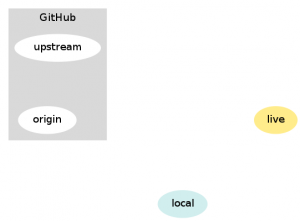__invoke(). Continue reading Yearly Archives: 2012
Monday Git Tips
git log and git show and in particular two of my favourite existing tricks:Continue reading
Pushing to Different Git Remotes
- there is a gatekeeper that manages merging to here
- all developers have write access
In this case, I’m working with the second option, so I’m pushing to the upstream repo. I’m also pushing to a live repository as well, so I thought I’d outline the commands I’m using. The setup here is the main github repo, and I have my own fork of that, which is cloned onto my laptop. I can push to both that main repo, which I’ll call “upstream” (because the github documentation does and it makes sense!) and another repo that I’ll call “live”. All in all it looks something like this:
Bit.ly API: Bundles and Short URLs
To get around this, I used their API to make a page which lists my bit.ly bundles, and creates shortlinks for each of them (once you’ve created a shortlink for a given URL once, bit.ly just re-uses the same ones the next time you ask to shorten the same URL, so this is less silly than it sounds).
In case the code is helpful, I thought I’d share. Continue reading
LAMP and Beyond, 30th June in Manchester
The idea is that we bring together a bunch of interested developers plus a few people who know something about some of the technologies which are often used with LAMP but aren’t part of the acronym – and work on … whatever you want to work on! Between us we’ll be able to advise on choosing and implementing new technologies for solving particular problems, troubleshoot some sticky issues, and maybe whip up some new projects to give you a chance to play with something new and shiny!
If you want to join, you can get tickets (but be quick, there aren’t many left) on eventbrite: http://lampandbeyond.eventbrite.com/ – see you there!
Proof that PHP 5.4 is Twice as Fast as PHP 5.3
My first attempt at benchmarking the two versions produced this:
Fetching Your Talks from the Joind.In API
I’ve recently been thinking that I should also do a better job of linking through to the various talks I’m giving/have given – and at around the same time I was contacted by the good folk at mojoLive about integrating against joind.in. To cut a long story short, the joind.in API now has the functionality for users to retrieve their list of talks! Continue reading
Downloading Files from Faspex
Continue reading
PHP Recursive Function Example: Factorial Numbers
Factorials
Factorials are a very easy maths concept. They are written like 5! and this means 5 * 4 * 3 * 2 * 1. So 6! is 720 and 4! is 24.
6! is the same as 6 * 5!, or 6 * 5 * 4! … and this is where the recursive functions come in. Continue reading
How the Web Looks to Me
I navigate the web using the Keyboard Navigation extension in Google Chrome, which is what is adding all the little labels you see in the screenshot above. Install the extension, and press comma. The labels will pop up, then you type whichever character(s) show next to the thing you want to “click” on, and off you go.
It’s super-simple, and easier to use than I expected. Why don’t you try it out on your own sites? You’ll get a sense of how the web looks from where I’m standing :)



